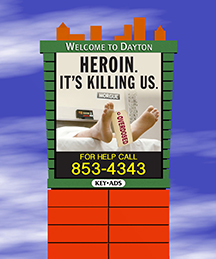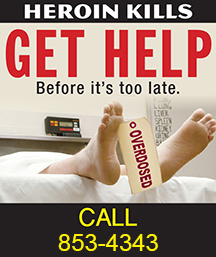
Welcome
DID YOU KNOW????
Notice of Privacy Practices: Did you know that when you receive services you are entitled to a Notice of Privacy from us and our contract providers? Click here to view our Notice of Privacy Practices
Begining July 1: ADAMHS will implement an important change!
Effective July 1, 2014, the ADAMHS Board will be implementing an important change in the way residents who are in need of services can receive those services, assessments and referrals. The following changes will be implemented:• Montgomery County residents no longer have to go to Crisis Care first to be assessed and referred to treatment providers.
• They may go to a provider of their choice. IMPORTANT: If they are indigent, they need to know that they should seek services from a provider who accepts indigent clients or they may be billed for services rendered.
• Residents without insurance, Medicaid or little/no income may receive services from ADAMHS contracted agencies.
• A directory of providers, including ADAMHS contracted agencies, is available at www.mcadamhs.org or by calling 937-443-0416.
• Persons in crisis may still call CrisisCare at 224-4646.
Release of Montgomery County Poisoning Death Review Report
Today, May 27th, 2014, Montgomery County's Public Health department released the Summary of Montgomery County Poisoning Death Review for 2010 - 2013.There was a dramatic increase in the overall number of unintentional drug overdose deaths in Montgomery County, from 162 deaths in 2012 to 226 in 2013. Unintentional drug overdose deaths have increased continuously in Montgomery County since 2010, but the increase of 64 deaths from 2012 through 2013 is unprecedented.
The increase of an additional 64 accidental drug overdose cases from 2012 through 2013 doubles the increase of 32 additional unintentional drug overdoses from 2011 to 2012.
There was a significant increase in the number of deaths involving heroin, from 95 in 2012 to 132 in 2013. This continues a trend that began in late 2011 and is of great public health concern. Get the Full Report here
Montgomery Co. Officials Using Billboards for Heroin Prevention


The Sheriff's Office and the Alcohol Drug Addiction and Mental Health Services Board announced they will each be funding an electronic billboard to put in different areas of town. The billboards highlight the deadly problem in the county and encourage people to call the special crisis help line.
The first 3 days of the billboard campaign yielded 29 phone calls to the hotline. If you know someone who needs help call the hotlline number 937-853-4343.
"The people who are dying are not junkies who are shooting up in some dark alley," said Montgomery County Commissioner Dan Foley. "The people who are dying are our mothers and fathers and sisters and brothers."
"In 2012, 680 people died of heroin overdose across the state. A 30% increase from 2011." said Montgomery County Sheriff Phil Plumber.
The in-depth study for heroin use in Montgomery County shows a continual increase.
Here are some current numbers when it comes to the deaths due to unintentional overdoses in the county:
- 2010 = 127 deaths
- 2011 = 130 deaths (+ 7)
- 2012 = 162 deaths (+ 32)
- 2013 = 226 deaths (+ 64)
Download the Report for 2013 here
On average, 500 Montgomery County residents are taken to emergency rooms or the coroner's office each year after a drug overdose.
IIf you would like to help donate, call the Sheriff's Office at 937-225-4009.
The ADAMHS Board of Montgomery County and
Montgomery County Department of Job & Family Services- Children Services Division present:
The Center for Adoption Support and Education’s
Training For Adoption Competency (TAC)
The Training for Adoption Competency (TAC) is a comprehensive training for professionals in the mental health and child welfare fields
to provide them with the clinical knowledge and skills they need to effectively serve the adoption kinship network.Developed by a panel of national experts, the standardized curriculum is based on adoption knowledge, values and skill competencies. Through information sharing, written resources, experiential learning, case studies, role playing, and introspective work, you’ll develop the competencies you need to enhance your career and enrich the lives of clients.
TAC has been rigorously evaluated through an initial pilot program and subsequent replications in which instructional delivery, learning outcomes, and impact on clinical practice were assessed. Trainees have not only given the training consistently high ratings for quality and relevance, but all have reported positive changes in their practice consistent with increased adoption competency.
We are the only site in Ohio to offer this evidence-based training by trainers that have been trained by the Center for Adoption Support and Education (C.A.S.E.) in Maryland http://adoptionsupport.org. The research supports that this is a very effective model to train counselors and change their practice patterns when dealing with individuals and families in need of adoption support. For more information click HERE
Overdose Kits are Coming...
In the war against heroin, there’s a new weapon. Thanks to a new state law, Ohioans are getting increased access to Naloxone or Narcan, a drug that temporarily kicks opiate users back to consciousness after an overdose. For residents like Lori Erion of New Carlisle, who has a family member struggling with heroin addiction, the drug is a potential lifesaver. “What’s happening is heroin is making its way into the lives and homes of people you would not have expected it to,” said Erion, who runs a group, Friends of Addicts, to support families wrestling with opiate addiction.Starting Monday, kits with Naloxone will be available in Miami Valley Hospital’s downtown emergency room. Samaritan Behavioral Health’s Crisis Care is already giving families a kit that includes Naloxone, County Alcohol Drug Addiction and Mental Health Services (ADAMHS) agency will soon give families similar Naloxone/Narcan kits. Dayton police are also officers with Narcan kits, as allowed under the new law. .
Learn more here::
County agency to launch pilot project
Approximately 62% of inmates have been abusing alcohol and/or drugs; 50% are homeless; 47% have a severe mental health illness; 19% have some level of developmental or learning disability, and 18% have attempted suicide.
The pilot project will fill gaps in services and provide a holistic plan for providing services pre and post-release. “Research shows that most successful reentry programs are achieved when treatment services begin in jail and continue in the community following release,” said ADAMHS Executive Director Helen Jones-Kelley.
The project will be a collaborative effort between ADAMHS, Samaritan Behavioral Health, Miami Valley Housing Opportunities and the Montgomery County Sheriff’s Department. &
Talking to/with Your Kids about Drugs
Talking to your kids about drugs is always a tough necessary subject to approach. As tough as it may be, getting the conversation started should be approached like any other health or safety concern. As a parent, you have to be the initiator of the conversation. Your kids are not going to be the one's to come to you to have a conversation about drugs. Here are some tips to help you have "The Talk"
- Be clear with your kids that you don’t want them using drugs.
- Talk often about the dangers and results of drug and alcohol use.
- Be a better listener. Ask questions and encourage them to talk to you.
- Give honest answers. Don’t lie if you used drugs in the past.
- Ask clarifying questions to make sure you understand.
- Use TV reports, anti-drug commercials etc. to introduce the subject.
- Don’t react in a way that will cut off discussion.
- Role play ways to refuse drugs and alcohol.
Research has shown that drug use risk increases between the 9th and 12th grades. Being an involved parent by having a conversation with your child, reduces this risk.
Recent News
OhioMHAS Announces Community Innovations Initiative
The Ohio Department of Mental Health and Addiction Services announced it will invest $1.5 million next year in projects that help link non-violent offenders with community-based behavioral healthcare services. The investments into the 12 collaborative projects in 24 counties is part of the Department's new Community Innovations Initiative, which kicked-off last week at the University of Findlay. The funding was acquired through savings resulting from the consolidation of state-funded agencies for mental health and addiction services. ....MoreSuicide Risk Management
There are over 38,000 completed suicides in the United States per year. It is the 10th overall leading cause of death and the 3rd cause of death for individuals aged 15-24. Over 90 percent of those who die by suicide meet criteria for a severe and persistent mental illness and the suicide rate has been increasing, particularly among our veterans and middle aged males. click here for More
Post-Traumatic Stress Disorder (PTSD)
After a traumatic experience, it's normal to feel frightened, sad, anxious, and disconnected. But if the upset doesn't fade and you feel stuck with a constant sense of danger and painful memories, you may be suffering from post-traumatic stress disorder (PTSD). It can seem like you'll never get over what happened or feel normal again. But by seeking treatment, reaching out for support, and developing new coping skills, you can overcome PTSD and move on with your life. For more information, Click hereEven Moderate Drinking in Pregnancy Can Affect a Child's IQ
Relatively small levels of exposure to alcohol while in the womb can influence a child's IQ, according to a new study led by researchers from the universities of Bristol and Oxford using data from over 4,000 mothers and their children in the Children of the 90s study (ALSPAC) and published November 14 in PLOS ONE. , click here.Site last updated: 6/04/2014 08:14

